

5 Tools to Help Students Learn How to Learn. Helping students learn how to learn: That’s what most educators strive for, and that’s the goal of inquiry learning.
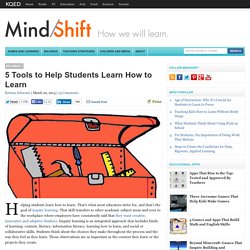
That skill transfers to other academic subject areas and even to the workplace where employers have consistently said that they want creative, innovative and adaptive thinkers. Inquiry learning is an integrated approach that includes kinds of learning: content, literacy, information literacy, learning how to learn, and social or collaborative skills. Students think about the choices they make throughout the process and the way they feel as they learn. Those observations are as important as the content they learn or the projects they create. “We want students thinking about their thinking,” said Leslie Maniotes a teacher effectiveness coach in the Denver Public Schools and one of the authors of Guided Inquiry: Learning in the 21st Century. 20 Questions To Guide Inquiry-Based Learning. 20 Questions To Guide Inquiry-Based Learning Recently we took at look at the phases of inquiry-based learning through a framework, and even apps that were conducive to inquiry-based learning on the iPad.
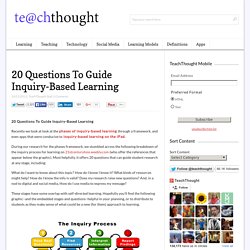
During our research for the phases framework, we stumbled across the following breakdown of the inquiry process for learning on 21stcenturyhsie.weebly.com (who offer the references that appear below the graphic). Most helpfully, it offers 20 questions that can guide student research at any stage, including: Creating Classrooms We Need: 8 Ways Into Inquiry Learning. If kids can access information from sources other than school, and if school is no longer the only place where information lives, what, then happens to the role of this institution?
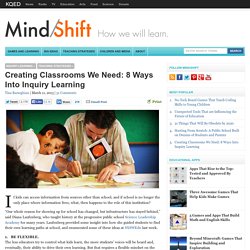
“Our whole reason for showing up for school has changed, but infrastructure has stayed behind,” said Diana Laufenberg, who taught history at the progressive public school Science Leadership Academy for many years. Laufenberg provided some insight into how she guided students to find their own learning paths at school, and enumerated some of these ideas at SXSWEdu last week. 1. Why Inquiry Learning is Worth the Trouble. Visualization of SLA principal Chris Lehmann's 2011 talk: guiding kids' to thinking about how they think.
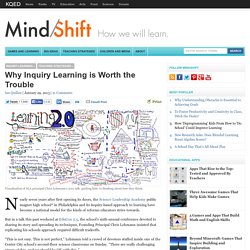
Nearly seven years after first opening its doors, the Science Leadership Academy public magnet high school* in Philadelphia and its inquiry-based approach to learning have become a national model for the kinds of reforms educators strive towards. But in a talk this past weekend at EduCon 2.5, the school’s sixth-annual conference devoted to sharing its story and spreading its techniques, Founding Principal Chris Lehmann insisted that replicating his schools approach required difficult tradeoffs. “This is not easy. This is not perfect,” Lehmann told a crowd of devotees stuffed inside one of the Center City school’s second-floor science classrooms on Sunday. “There are really challenging pieces of this, and we should be OK with this.” The Challenges and Realities of Inquiry-Based Learning. Inquiry Learning Teaching Strategies Getty By Thom Markham Teachers in a rural southeast Michigan high school were recently discussing the odd behavior of the senior class.
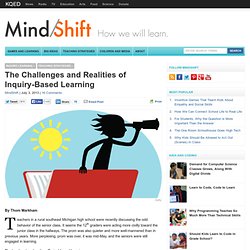
Fostering student research through scientific inquiry and online mentorship. The Inquiry Project. The ASK Project. Nexgen Inquiry.